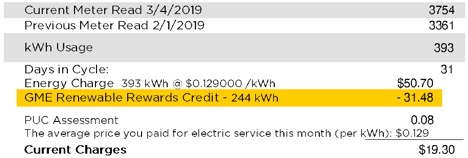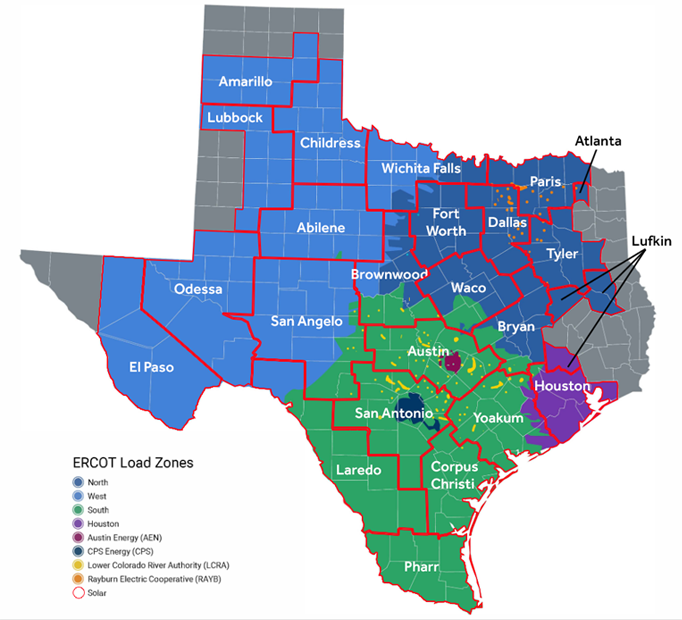-
Installing a rooftop solar system will help you save on energy costs for years to come, and with Renewable Rewards, you’ll be credited when you produce more energy than you use. You’ll also significantly lower your home’s carbon footprint and help ensure a cleaner, greener future for the planet.





Solar Products
Renewable Rewards® Buyback Plans
If you have solar panels, you can get rewarded for creating excess solar energy.
Texans, you've already taken a big step toward helping the planet by choosing to install a solar panel system. Now, make the most of your investment with one of our Renewable Rewards® Buyback plans.
Our plans allow you to send extra energy from your solar panels directly to the grid, earning credits for the excess energy generated.
In return, you’ll receive bill credits that you can use when you draw electricity from the grid. And during those times, we’ll back your usage with 100% renewable energy—so you can enjoy peace of mind, even on cloudy days.
By signing up for a Renewable Rewards plan, you can save on energy costs, reduce your carbon footprint, and maximize the impact of your solar energy system.
Which solar plan is right for you?
Renewable Rewards Essentials plan
Best For?
Homeowners with solar panels looking to sell their electricity back to the grid for a credit on their bill.
Plan Details & Benefits
Earn bill credits for your excess solar energy, up to your monthly usage.
100% solar energy at a fixed price for the length of your term.
Renewable Rewards Solar Credit plan
Best For?
Homeowners who want to get more out of their solar system by driving down energy costs.
Plan Details & Benefits
Earn unlimited bill credits for the excess solar energy you produce.
100% solar energy at a fixed price for the length of your term.
Renewable Rewards Solar Max plan
Best For?
Homeowners who want real-time market value for their excess solar so they can optimize usage.
Plan Details & Benefits
Earn bill credits for your excess solar energy based on 15-minute real-time wholesale prices, with no cap.
100% solar energy at a fixed price for the length of your term.
Here’s how it works:



With a Renewable Rewards plan, you’ll enjoy:
100% renewable backup energy
When you use grid electricity, we’ll make sure it’s 100% renewable.
Bill credits
Receive credit for the excess solar energy you send to the grid.1
Term Flexibility
Choose from 12-month, 24-month or month-to-month plans.
Why choose Green Mountain Energy?
- We buy back the excess electricity you produce.
- When you need energy from the grid, we match your usage with 100% renewable energy.
- We share your goal of making a positive impact on our planet. You could prevent more than 17,000 pounds of CO2 per year. That's like driving 18,500 fewer miles!2
- We are the longest-serving renewable energy retailer in the United States.
General FAQs
Why should I switch to Renewable Rewards®?
Why should I switch to Renewable Rewards®?
What are the eligibility requirements for Renewable Rewards?
What are the eligibility requirements for Renewable Rewards?
-
The Renewable Rewards Buyback Program is available to new and existing residential customers in Texas who:
- Have installed home solar or small-scale wind systems with a capacity of 50 kW or less.
- Have an interconnection agreement in place with their utility.
- Have a meter configured by their utility that separately measures the inflow and outflow of electricity to and from their home.
Do I need a special meter?
Do I need a special meter?
-
Yes. You’ll need a meter configured by your utility that separately measures the inflow and outflow of electricity to and from your home. Your utility may charge for this meter, and these charges would be passed through to you on your Green Mountain Energy bill.
Can current Green Mountain Energy customers enroll in a Renewable Rewards buyback plan?
Can current Green Mountain Energy customers enroll in a Renewable Rewards buyback plan?
-
Yes! Both current and new Green Mountain Energy customers who meet the program requirements listed above can enroll in a Renewable Rewards buyback plan. If you’re a current customer enrolled in a plan with a cancellation fee, we will waive that fee if you would like to switch to a Renewable Rewards buyback plan, assuming all the requirements are met.
The Renewable Rewards Buyback Program is available to new and existing residential customers in Texas who have installed home solar or small-scale wind systems with a capacity of 50 kW or less.
What is net metering?
What is net metering?
-
To put it simply, net metering lets you produce energy for the grid beyond what you use for your own home. With Renewable Rewards, you’ll receive a bill credit for excess energy that you’ve produced.
What is excess energy?
What is excess energy?
-
The electricity produced by your solar panels first powers your home. But when your panels produce more energy than you need, the remaining energy is delivered to the grid.
What is the difference between my solar production and the excess energy delivered to the grid?
What is the difference between my solar production and the excess energy delivered to the grid?
-
There are a few different terms that describe energy your solar array produces and energy your house consumes, including:
- Solar production—the total electricity produced by your panels.
- Solar consumption—the solar energy used to power your home.
- Grid usage—energy pulled from the grid when your panels do not produce enough electricity to cover your needs.
What are the benefits of solar energy?
What are the benefits of solar energy?
-
The most obvious benefit is that you’re contributing to a cleaner, greener future! Solar energy produces no greenhouse gases or other waste. Any extra energy you produce can also be stored on a backup battery or sent back to the grid.
What are excess energy bill credits and how do they work?
What are excess energy bill credits and how do they work?
-
We buy back the energy that your solar panels deliver back to the grid. Your excess energy credits will show up on the second page of your electricity bill on the “Renewable Rewards Credit” line:

When should I enroll in a Renewable Rewards buyback plan?
When should I enroll in a Renewable Rewards buyback plan?
-
You can enroll at any time, but to ensure that you receive credit for your excess solar energy as soon as possible, we recommend setting your enrollment date to be the same day you expect to receive Permission to Operate (PTO) from your utility. You can set your enrollment date for a Renewable Rewards buyback plan up to 60 days in advance.
How long does it take after I enroll in a Renewable Rewards buyback plan to start receiving excess energy credits?
How long does it take after I enroll in a Renewable Rewards buyback plan to start receiving excess energy credits?
-
It can take up to three billing cycles after you receive Permission to Operate (PTO) and are signed up on a Renewable Rewards buyback plan before excess energy credits appear on your bill. Both Green Mountain Energy and your utility must make system changes to process your excess energy readings, and these changes take time to complete.
Why am I not receiving credits for excess energy produced by my solar array?
Why am I not receiving credits for excess energy produced by my solar array?
-
There are a few steps to take if you are not receiving excess energy credits:
- Wait for three billing cycles after receiving Permission to Operate (PTO) from your utility.
- If the issue persists, contact your solar installer to confirm that your solar array has passed inspection and that you have a signed Interconnection Agreement with your utility.
- If it has been more than three billing periods and your solar installer has completed the steps above, then reach out to Green Mountain Energy Customer Care at 1-866-785-4668 to ask about your Renewable Rewards credits.
- Wait for three billing cycles after receiving Permission to Operate (PTO) from your utility.
Do my credits transfer if I switch plans?
Do my credits transfer if I switch plans?
-
Yes. A Renewable Rewards customer’s existing credit balance carries over if they swap to a different plan with Green Mountain Energy.
Why does my credit change from month to month?
Why does my credit change from month to month?
-
Both your energy usage and solar production vary each month because of factors such as:
- Variable weather conditions—solar production is typically higher in the spring and summer.
- Changing usage patterns—usage is typically higher in the summer.
- Potential equipment malfunctions—if your system is underproducing, contact your solar installer.
How do I sign up for a Renewable Rewards buyback plan?
How do I sign up for a Renewable Rewards buyback plan?
-
Existing Green Mountain Energy customers in Texas can enroll by calling us at 1-866-785-4668 to switch their electricity plan to a Renewable Rewards buyback plan.
New customers in Texas can enroll in a Renewable Rewards buyback plan online, or by calling us at 1-866-301-3120.
If I still have questions, who can I talk to?
If I still have questions, who can I talk to?
-
If you have questions about your electricity bill or plan, call Green Mountain Energy at 1-866-785-4668.
If you have questions about your solar panels or don’t think your system is producing as much power as it should, contact your installer.
Who do I contact about interconnection to the grid and configuring my meter?
Who do I contact about interconnection to the grid and configuring my meter?
-
Contact your utility to learn more about interconnection to the grid and configuring your meter to separately measure the inflow and outflow of electricity from your home.
Oncor
- Phone: 1-888-313-6862
- Email: contactcenter@oncor.com
- Contact page: https://www.oncor.com/SitePages/ContactUs.aspx
CenterPoint
- Phone: 1-800-752-8036
Texas New Mexico Power
- Phone: 1-888-866-7456
- Contact page: http://www.tnmp.com
AEP Central and AEP North
- Phone: 1-877-373-4858
- Contact page: https://www.aeptexas.com/contact/
Renewable Rewards Essentials plan FAQs
What is the Renewable Rewards Essential plan?
What is the Renewable Rewards Essential plan?
-
The Renewable Rewards Essential plan allows homeowners with rooftop solar panels to sell excess electricity back to the grid and receive credits on their energy bill, up to their monthly energy usage from the grid.
Who is eligible for this plan?
Who is eligible for this plan?
-
Homeowners with a rooftop residential solar panel system installed on their home who want to sell their excess electricity back to the grid.
How does the Renewable Rewards Essential plan work?
How does the Renewable Rewards Essential plan work?
-
When your solar panels produce more electricity than you use, the extra energy is sent to the grid. You'll receive a credit for this energy, but only up to the amount of energy you consume from the grid in a billing cycle. Delivery charges, base charges, taxes, and other fees are NOT included in the credit.
Is there a limit on how much solar energy I can send to the grid?
Is there a limit on how much solar energy I can send to the grid?
-
Yes. Credits are limited to the amount of energy you consume from the grid during the billing cycle. Energy sent beyond your monthly usage will not earn additional credits.
Where can I see my solar energy credits?
Where can I see my solar energy credits?
-
Your excess energy credits will appear on the second page of your electricity bill under the “Green Mountain Energy Renewable Rewards Credit” line.
How are my solar credits calculated?
How are my solar credits calculated?
-
The bill credit rate matches the energy charge rate of your plan. It does not include delivery charges, base charges, taxes, or other fees. Credits are applied up to your grid energy usage for the billing cycle.
Are there additional charges?
Are there additional charges?
-
Yes, standard charges such as delivery charges, monthly base charges, taxes, and other applicable fees are not covered by the credits and will still apply to your bill.
What are the key features of the plan?
What are the key features of the plan?
-
- Earn credits for excess solar energy sent to the grid, capped at your monthly grid usage.
- Use grid electricity that is backed by 100% solar energy.
- Choose from flexible term lengths to suit your needs.
What happens if I use more energy from the grid than my solar panels produce?
What happens if I use more energy from the grid than my solar panels produce?
-
If your energy consumption from the grid exceeds the credits you’ve earned, you’ll pay the standard energy charge rate for the additional energy.
Can I have a zero-dollar bill with this plan?
Can I have a zero-dollar bill with this plan?
-
No, the plan does not allow for a zero-dollar or negative bill because credits are capped at your grid usage and do not apply to non-energy charges like delivery fees or taxes.
Renewable Rewards Solar Credit plan FAQs
What is the Renewable Rewards Solar Credit plan?
What is the Renewable Rewards Solar Credit plan?
-
The Renewable Rewards Solar Credit plan is an uncapped solar buyback program designed for homeowners with rooftop solar panels. It gives you credit for the excess electricity your panels generate and send to the grid, helping you save on energy costs and support a cleaner planet.
Who is eligible for this plan?
Who is eligible for this plan?
-
Homeowners with a rooftop residential solar panel system installed on their home who want to sell their excess electricity back to the grid.
How does the Renewable Rewards Solar Credit plan work?
How does the Renewable Rewards Solar Credit plan work?
-
When your solar panels generate more electricity than you need, the excess energy is sent to the grid for others to use. You’ll receive bill credits for this excess energy, which can offset the charges for the electricity you use from the grid.
Is there a limit on how much solar energy I can send to the grid?
Is there a limit on how much solar energy I can send to the grid?
-
No, there are no limits or caps on the amount of solar energy you can send to the grid or the credits you can earn.
Where can I see my solar energy credits?
Where can I see my solar energy credits?
-
Your excess energy credits will appear on the second page of your electricity bill under the “Green Mountain Energy Renewable Rewards Credit” line.
How are my solar credits calculated?
How are my solar credits calculated?
-
The credit per kilowatt-hour (kWh) for your excess solar energy is at a lower rate than the energy charge rate for the Renewable Rewards Solar Credit plan. The exact rates are listed in your Electricity Facts Label.
Are there additional charges?
Are there additional charges?
-
Yes, base and delivery charges from your utility are passed on to your bill. These are separate from the energy charges.
What are the benefits of the Renewable Rewards Solar Credit plan?
What are the benefits of the Renewable Rewards Solar Credit plan?
-
- Receive credit for 100% of the excess solar energy you send to the grid.
- Grid electricity you use is backed by 100% renewable solar energy.
- Choose from a variety of plan term lengths to match your green lifestyle.
Can I have a zero-dollar or negative bill with this plan?
Can I have a zero-dollar or negative bill with this plan?
-
No, the plan does not guarantee a zero-dollar or negative bill due to differences in energy charge rates and solar credit rates.
Renewable Rewards Solar Max plan FAQs
Does Green Mountain buy back energy that solar panels deliver back to the grid?
Does Green Mountain buy back energy that solar panels deliver back to the grid?
-
Yes. With our Renewable Rewards buyback plans, you receive credit for all the excess energy your solar energy system delivers to the grid. For the Renewable Rewards Solar Max plan, the rate per kWh you are credited for excess electricity is the real-time wholesale rate for your Load Zone, with no cap on the amount you can earn. Your excess electricity credits will show up on your electricity bill on the “Bill credit” line.
Please note that the Renewable Rewards Solar Max plan is only available for Texas residential customers who meet the plan requirements.
How is the excess energy credit calculated?
How is the excess energy credit calculated?
-
For each 15-minute interval:
Buyback credit amount = (Buyback rate in $/kWh) x (Excess energy delivered to the grid in kWh during the 15-min. interval)
The buyback rate is equal to ERCOT Load Zone Real Time Settlement Point Price (RTSPP) in the 15-minute interval for the customer’s load zone. If the RTSPP is less than zero for a given 15-minute interval, the credit amount will be zero for that interval.
The credit amount for the bill period will be the sum of the credit amounts across all 15-minute intervals in that period.
In the event Green Mountain Energy receives incomplete interval data from your TDSP, Green Mountain Energy may estimate your outflow kWh for missing periods based on the monthly meter read reported by the TDSP. When there is a difference in outflow kWh between the monthly meter read and the monthly total of the interval data, the difference will be allocated over missing intervals and the estimated outflow kWh will be used to calculate credit amounts applied to your bill.
Are there any caps or limits on excess energy credits?
Are there any caps or limits on excess energy credits?
-
No, there are no caps on excess electricity credits. Customers enrolled on the Renewable Rewards Solar Max plan that meet the eligibility requirements will receive credits for all excess electricity delivered to the grid. If the credits exceed the charges on your monthly invoice, the remaining credits will carry forward to the next month.
Where can I learn more about real-time wholesale prices used to calculate the bill credit on my bill?
Where can I learn more about real-time wholesale prices used to calculate the bill credit on my bill?
-
See the map below to find your ERCOT 15-minute RTSPP load zone.

Why does my solar monitoring sensor not match the excess energy on my Renewable Rewards Solar Max bill?
Why does my solar monitoring sensor not match the excess energy on my Renewable Rewards Solar Max bill?
-
Your Renewable Rewards Solar Max buyback plan bill shows:
- Your energy usage from the grid, or the inflow of electricity through your meter (shown on the “Energy Charge” line).
- The excess solar energy for which you are credited (shown on the “Renewable Rewards Credit” line).
Both your grid usage and your excess energy are measured by the meter installed by your utility. The bill does not show your total solar production, which may be measured by your solar monitor. This is because some of the solar power is immediately used by your house and never flows to the grid.
You can download your excess energy export data from your Smart Meter Texas account or request a paper copy by calling a Solar Call Center Specialist at 1-855-465-5061.
Just getting started?
Read more about the benefits of choosing solar for your home.

Get Powered by Sunshine.
We believe that everyone should have the power to choose clean, renewable solar energy to power their lives.

Lower your energy costs, and help clean up the grid.
Read about the advantages of gaining Solar Independence.
1Subject to limitations. Please see your contract documents for details.
2Source: U.S. Environmental Protection Agency, 2019. Waste Reduction Model (WARM), Version 15, February; impact statistic based on the average vehicle carbon emissions per mile driven in the U.S.
Our customers have avoided
pounds of CO2
That’s like planting
new trees.